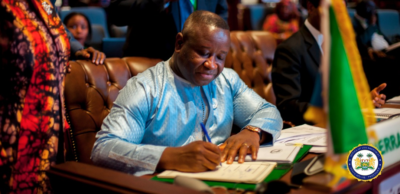
Sierra Leone Telegraph: 7 January 2019:
The removal of government subsidy on fuel – very often in response to IMF structural adjustment conditionalities, is one of the most controversial policy decisions any government can take in Africa.
It is a decision fraught with huge political risk and has the potential to lead to social and political unrest.
Today, the government of president Julius Maada Bio of Sierra Leone, has announced that after months of having removed government subsidy from the pump price of fuel on the advice of the IMF, prices of fuel are to be reduced.
 Economic hardship is biting very hard in Sierra Leone. Inflation now stands at over 19%.
Economic hardship is biting very hard in Sierra Leone. Inflation now stands at over 19%.
Prices of basic consumer items are skyrocketing beyond the reach of the average Sierra Leonean, as the value of the Leone – driven by falling exports, continues to remain at 30% its 2013 value in exchange to the Pound or Dollar.
Although global oil prices have dropped in the past couple of years, yet the pump price of fuel in Sierra Leone is quite high, especially with the recent removal of government subsidy.
Successive governments in Sierra Leone have been reluctant to pass on the fall in global cost of oil to consumers. But in his New Year’s message to the people of Sierra Leone, president Bio promised that 2019 will be a year of hope of a brighter future.
And that future it seems starts now, with his announcement today of a reduction in the prices of petroleum products, with immediate effect.
The impact of this reduction is certain to be felt in lower transportation costs for households and businesses.
Prices of consumer goods are also expected to fall as a result of today’s announcement, which should lead to a drop in inflation.
But unemployment and falling export revenue, must be addressed by the government as a matter of urgency.
Today’s announcement has seen the pump price of petrol reduced from Le8,000 to Le7,000 per litre. This is the government’s statement showing other price reductions:

The IMF has always forced governments to swallow bitter pills in exchange for debt. I always call it debt and not funding. These sorts of austerity measures sometimes lead to chaos because the ordinary citizens will be feeling the pinch. What governments should be doing is to explain to their citizens exactly what the IMF means.
The ministry of finance should organise public seminars and hold discussions with the people to enlightened them. The average Sierra Leonean will be relieved by the reduction in the fuel prices that the government just announced. But more needs to be done.
I am not an economist. But I have an advice for the financial secretary. I don’t know whether my idea is feasible economically or it is sort of socialist. However, let me give him my advice. Instead of giving salary increases to workers, the government can for example reduce the price of rice and other basic commodities with the same percentage as the salary increase.
If the IMF asked the government to remove the subsidies on fuel, the government can reduce the tax or import duty on petroleum products. The price of the petroleum products will still be low. Would that not be a good idea? I leave the floor to the economists to help clarify.
A brilliant idea Sir.